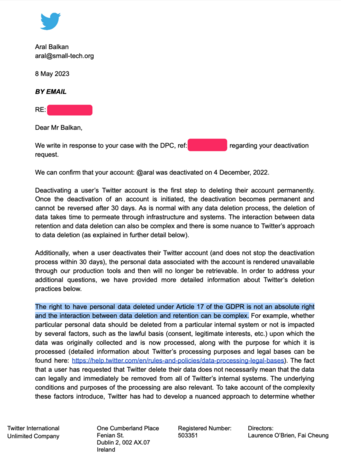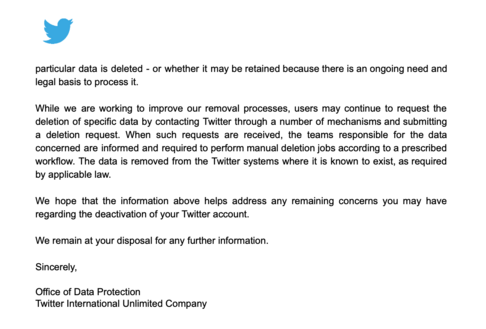
Folks, please do delete your X accounts, by all means, but I’d be very surprised if that meant that your data is deleted or that Elon Musk won’t be using it to train his AI, etc.
I put in a data deletion request after deactivating my account in 2022 and set the Irish DPC on them when they didn’t. After several back and forths, with the Irish DPC being less than worthless, I gave up. Afaict, there is zero enforcement of GDPR Article 17.
CC @noybeu
What is the correct way to configure .htaccess to send all requests to a unix domain socket?
Ivtried variour enchantement with mod_proxy and mod_rewrite without success.
.htaccess only because I want it to work on shared hostings.
Also, what about NON php fcgi?
I couldn't even get it working with mod_proxy_cgi (again, .htaccess only). The receiving server is up and running, listening at the destination UDS.
Am I missing something obvious?
Negli elenchi aggiornati delle riviste dichiarate scientifiche dall’ANVUR continua a mancare Open Research Europe (ORE), infrastruttura di revisione paritaria aperta offerta dalla Commissione dell’Unione Europea agli autori i cui lavori di ricerca sono esito di finanziamenti europei. Visti i precedenti, questa assenza non sorprende. Ed era anche già chiaro che la recente “Disposizione […]
I started adding a POLITICS.txt to my projects 5 years ago, after writing my essay "What is Informatics?": https://encrypted.tesio.it/2019/06/03/what-is-informatics.html#be-political
Writing the POLITICS.txt for a project is always pretty difficult: it means to be explicit with your hopes and ambitions while finding the right words to express them is hard and often lead other developers to mock you even if they use and appreciate the code you wrote.
You can see a recent example here: https://code.tesio.it/p/self-hosting/doh.cgi/file?name=POLITICS.txt&ci=tip
I think nobody (except my daugthers) is entitled to my work.
Not even managers at work can force me to do something I don't want to do, so much that "It cannot be done" and "I don't know how to do it" and "give me a five years and a team of five very skilled engineers, and I'll do it" are well known show-stopper at work.
When I share my high-skilled work, I set up whatever license I see fit (sometime debating with #OSI board gatekeepers, cause I like #copylefts they hate) and usually set an explicit POLITICS.txt to explicitly explain the socio-technical goals of the project.
Usually it does NOT cover governance because forks are welcome (within the rules of the license, obviously)
I attended the EDPB event on #PayorOkay models and left deeply concerned. The discussion lacked acknowledgment of data protection as a fundamental right and ignored clear GDPR principles making the model unlawful. Instead, it conflated ads with core services, sidelining fairness and rights. Surveillance ads harm individuals and society, yet their ‘value’ is overstated. We must reclaim the debate: data protection is key to human dignity and a rights-respecting digital future.
I think that with a pid and an oprion to automatically demonize (sysv way, doible fork, setsid, detaching from the terminal...) it would be trivial to run snac on a shared hosting even if it doesn't support fastcgi: you just need a script to start it.
Hi, I managed to build a statically linked #snac with musl (and zlib, curl and openssl).
Now I realized that I could deploy it as a FastCGI, but I wonder how I could stop a running process on snac update.
Is there a kill switch one could toggle eg by creating an empty file with a specific name under the data dir? Or maybe a version file that is periodically checked by snac processes that exit() when you start a new version?
Or maybe something even simpler I'm missing?
Also, I've read that snac now support unix domain sockets, but I can't find anything about that in the doc... where should I look?
The server can now act as a proxy for all image, audio or video media coming from other account's posts (both from the Web UI and the Mastodon API). This way, other servers will see media requests coming from the server IP, not the user's, improving privacy. This is controlled by setting the
proxy_media boolean field to server.json to true.The
strict_public_timelines option introduced in the previous release now works correctly.Fixed a crash when posting from the links browser.
Fixed some repeated images from Lemmy posts.
Fixed a crash when posting an image from the tooot mobile app.
Updated FreeBSD rc script: the server process is now managed by the daemon(8) utility (contributed by @stefano@bsd.cafe).
RSS feeds are now in 2.0 version instead of 0.91.
https://comam.es/what-is-snac
If you find #snac useful, please consider contributing via LiberaPay: https://liberapay.com/grunfink/donate
#snacAnnounces
This release has been inspired by the song New Moon (Dark Phase) by #DuranDuran.
It's not.
It's a stance OSI got by its sponsors https://opensource.org/sponsors
Meta in particular was allowed to cancel other teams' votes.
The issues have been reported by several people for months (here a recap https://discuss.opensource.org/t/list-of-unaddressed-issues-of-osaid-rc2/650 ) but OSI ignored them, silenced or censored those people.
See Julia Ferraioli's account of the co-design process: https://www.linkedin.com/posts/juliaferraioli_opensource-opensourceai-osi-activity-7256687721182605313-_wpd
If you feel disgusted as I do, here an initiative to restore (and _maybe_ improve) the OSD through public discussion and IETF rough consensus https://opensourcedefinition.org/wip/
@knowprose @sj Thanks for sharing this, it's good to know there's a sizable community that is unhappy with how OSAID got rolled out.
@sj @jaredwhite Through LinkedIn, I got invited to this discussion area regarding the topic... So I'm passing it along.
I haven't had enough contiguous time yet to chime in, but I will.
*Dusts off penguins and Gnus*




